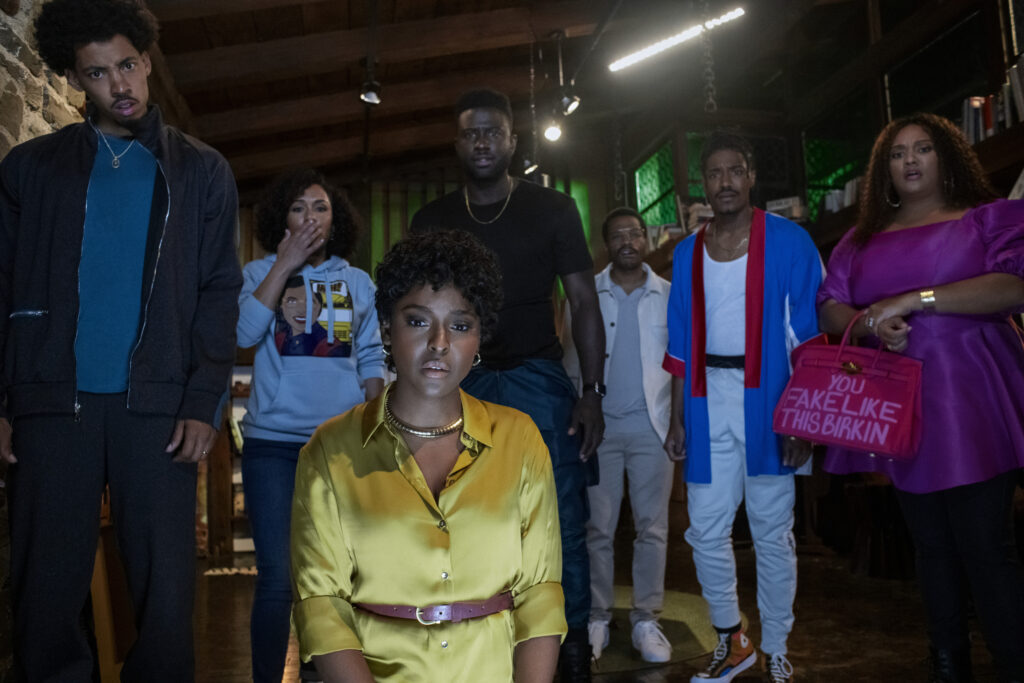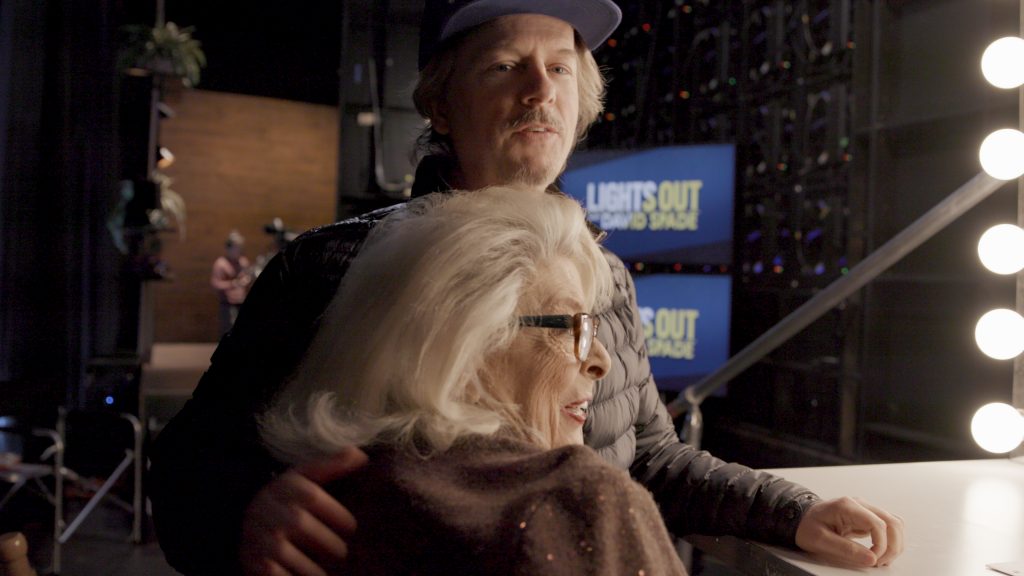June 14, 2023
by Carla Hay

Directed by Tim Story
Culture Representation: Taking place in the Los Angeles area, the horror comedy film “The Blackening” features a predominantly African American cast of characters (with some white people) representing the working-class and middle-class.
Culture Clash: Nine people gather at remote house in the woods for a Juneteenth weekend and are targeted by a serial killer or serial killers demanding that the house guests answer questions about African American history and pop culture in a bizarre, race-baiting board game.
Culture Audience: “The Blackening” will appeal primarily to people who want to watch a frequently boring comedy full of racist jokes that are corny and stupid.

“The Blackening” tries very hard to combine the parody of “Scary Movie” and the social commentary of “Get Out,” but the results are mostly cringeworthy, unimaginative and not very funny. The ending of the movie also drags and has no suspense. Worst of all, the so-called “jokes” sound like they would’ve been rejected from a Wayans Brothers movie in the 1990s. “The Blackening” filmmakers tried to make this dreadfully empty movie look more “modern” by adding in some social media references as part of the plot, but it’s all just a smokescreen for this disappointingly lackluster and stale film. “The Blackening” had its world premiere at the 2022 Toronto International Film Festival and its U.S. premiere at the 2023 Tribeca Festival.
Directed by Tim Story, “The Blackening” was written by Tracy Oliver and Dewayne Perkins, who is one of the co-stars of the film. It should come as no surprise that Perkins wrote the most well-rounded and most believable character for himself in the movie. All of the other characters in “The Blackening” are hollow stereotypes. And that might be acceptable if most of the scenes “The Blackening” were genuinely funny.
Unfortunately, the movie is just one flat soundbite after another, which usually has one of these three themes: (1) the characters comment on or react to white supremacist racism; (2) the African American characters try to prove who’s the most “authentic” in being black; (3) relationship tensions involving mistrust.
“The Blackening” (which was filmed on location in the Los Angeles area) focuses on nine African American friends who have gathered for a getaway at an Airbnb rental house in a remote wooded area for Juneteenth weekend. Morgan (played by Yvonne Orji) and Shawn (played by Jay Pharoah) have arrived ahead of their friends at this house. Inside the house, Morgan and Shawn find an unusual-looking board game called The Blackening that has a racially offensive Sambo face at the center of the board.
Morgan and Shawn start playing the game when the Sambo face begins talking and says that they have to answer trivia questions about black people in history and pop culture. If Morgan and Shawn get any of the answers wrong, then they will die. The Sambo face starts cackling menacingly. None of it is really scary, of course, and the board game looks completely phony and amateurish, like an art project that a child could have made.
An example of a trivia question that Morgan and Shawn get is to name a black character from a horror movie who didn’t die first in the movie. It’s “The Blackening’s” way of poking fun at the cliché that the first person to die in a horror movie is a black person. “The Blackening” over-uses this “joke” to the point where it becomes obvious that the writers ran out of ideas. At any rate, something bad happens to Morgan and Shawn. Morgan and Shawn have gone missing by the time the other seven people arrive at the house.
The other seven people on this getaway trip are neurotic attorney Tracy (played by Antoinette Robertson); her sassy gay best friend Dewayne (played by Perkins); Tracy’s smooth-talking ex-boyfriend Nnamdi (played by Sinqua Walls); crude loudmouth Shanika (played by X Mayo); spoiled diva Allison (played by Grace Byers); laid-back stoner King (played by Melvin Gregg); and socially awkward misfit Clifton (played by Jermaine Fowler), who’s not really a friend, but he says he got a last-minute invitation from Morgan.
During Shanika’s road trip to the house in the woods, Shanika actually meets Clifton at a gas station convenience store, where they debate over which type of phone is better: an Android (Clifton’s preference) or an iPhone (Shanika’s preference). It’s just one of many examples of how the movie’s ideas are often painfully dull and lack creativity in time-wasting dialogue.
“The Blackening” also has the predictable depictions of racially charged encounters with white people being openly hostile to the black travelers. A convenience store clerk (played by James Preston Rogers) gives a hateful stare to Shanika while she’s a customer in the store. A white park ranger with the last name White (played by Diedrich Bader) stops the car that Tracy is driving with Dewayne, Allison and King as passengers. This detainment is for no other reason than Park Ranger White isn’t used to seeing black people in this area, and Tracy has to show proof that she has a legitimate rental for the house.
It’s not long before the seven people are all gathered in the house and find The Blackening game and are subjected to answering a barrage of African-American oriented questions. The disappearance of Morgan and Shawn is often forgotten as the seven house guests get caught up in playing this game. Just like Morgan and Shawn, the seven house guests are threatened with death if they get any of the questions wrong. Some of the questions include “Who is Sojourner Truth?” Viewers might be asking themselves, “Is this a horror comedy or a history test?”
One of the questions asked is: “Name five black people who were in ‘Friends.'” The Sambo face answers that question itself by saying, “I don’t know. I don’t watch that show. I watched ‘Living Single.'” It’s a very outdated joke that would have worked better in the mid-to-late 1990s, when both of those shows were on the air.
“The Blackening” takes a while to get to any real horror in the story. Instead, the movie stretches out its very thin plot with some backstory information on some of the characters. All of these backstories involve a lot of bitterness. Tracy and Nnamdi had a bitter breakup because he cheated on her. Tracy is bitter because Nnamdi has a new girlfriend. Nnamdi is bitter because Tracy was the one who broke up with him.
Dewayne is bitter because he thinks Tracy takes their friendship for granted and only seems to need him after she’s broken up with a boyfriend. Shanika is bitter about being discriminated against for being for a large-sized black woman, even though she lacks self-awareness that her obnoxious attitude is really her problem. Allison is bitter because she’s biracial and always feels that she has to prove to her black friends that she’s “black enough.” King is bitter because he feels he’s misjudged for being married to a white woman, who is never seen or heard in this movie.
“The Blackening” is obviously not meant to be taken seriously. But the movie has so many missed opportunities where it could have been funnier. The friends have a debate about “who’s the blackest person in the group,” in terms of attitude, not physical appearance. This debate drones on and on until it loses its intended impact.
When nerdy Clifton blurts out that he voted for Donald Trump twice and says that “Beyoncé’s Super Bowl performance made me feel unsafe,” the other people in the group are horrified and immediately question if Clifton is really black. This type of racial stereotyping for comedy could have been handled in a wittier way. Instead, it just lazily rehashes jokes that have been done in one form or another in a lot of stand-up comedian routines.
The action scenes in “The Blackening” are poorly staged and insult viewers’ intelligence. The acting performances range from mediocre to irritating. And the answer to the mystery of who the killer is could have been intentionally obvious, but it still drains a lot of the intrigue that “The Blackening” could have had.
“The Blackening” is the type of low-quality movie that is neither great nor the worst of the worst. As far as race-based comedies go, it has nothing new or interesting to say about African American culture or race relations. “The Blackening” just sinks into a cinematic version of noxious quicksand, where weak and unremarkable movies go and are quickly forgotten.
Lionsgate will release “The Blackening” in U.S. cinemas on June 16, 2023.




